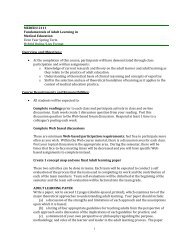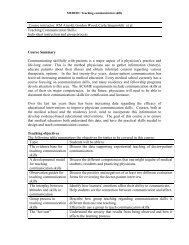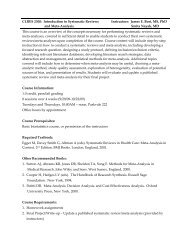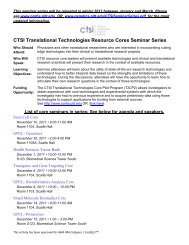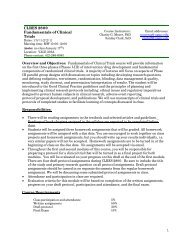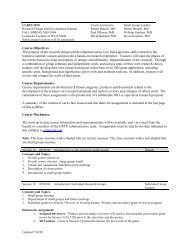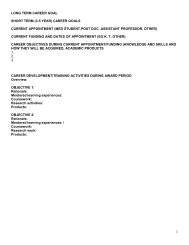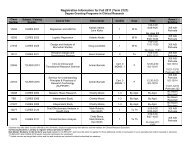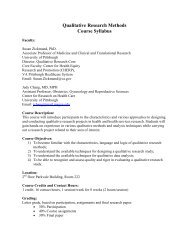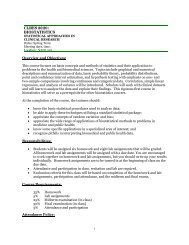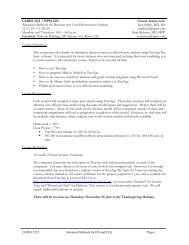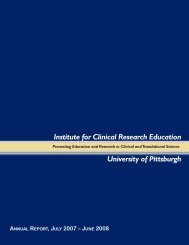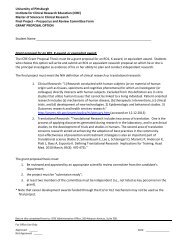Student Handbook - Institute for Clinical Research Education
Student Handbook - Institute for Clinical Research Education
Student Handbook - Institute for Clinical Research Education
Create successful ePaper yourself
Turn your PDF publications into a flip-book with our unique Google optimized e-Paper software.
The trainee's presentation to the review committee should be scheduled at least two months<br />
prior to graduation to allow enough time <strong>for</strong> revisions and subsequent reviews. Once approval is<br />
granted by the review committee and <strong>for</strong>mal documentation is submitted to the ICRE, the trainee<br />
will receive a passing grade and will be permitted to proceed with the graduation ceremonies.<br />
B. Certificate in <strong>Clinical</strong> <strong>Research</strong><br />
To obtain a Certificate in <strong>Clinical</strong> <strong>Research</strong>, students must complete a minimum of 15 credit hours<br />
of coursework, including the core curriculum in clinical research and 5 elective credits. Depending<br />
on individual clinical responsibilities and the total number of courses taken, the Certificate in<br />
<strong>Clinical</strong> <strong>Research</strong> generally requires 1 - 2 years of study to fulfill all the requirements; students have<br />
up to 4 years though to complete. The timing and scheduling <strong>for</strong> many of the courses in the<br />
program are designed to help students balance their multiple responsibilities. In addition to the<br />
regular Certificate in <strong>Clinical</strong> <strong>Research</strong>, there is also the Certificate in <strong>Clinical</strong> and Translational<br />
Science <strong>for</strong> Doctoral <strong>Student</strong>s in the Health Sciences (CTS Certificate). This certificate is <strong>for</strong> other<br />
PhD students in any of the Schools of Health Sciences and is completed in conjunction with their<br />
doctoral degree.<br />
1. Course Requirements<br />
<strong>Student</strong>s must complete the required core curriculum in <strong>Clinical</strong> <strong>Research</strong>. In addition, they are<br />
required to take 5 additional credits of elective coursework. A Plan of Study can be found in<br />
Appendix D.<br />
Summer Term Fall Term Spring Term<br />
CLRES 2005: Computer<br />
Methods in <strong>Clinical</strong> <strong>Research</strong> (1<br />
credit)<br />
CLRES 2010: <strong>Clinical</strong> <strong>Research</strong><br />
Methods (3 credits)<br />
CLRES 2020: Biostatistics (4<br />
credits)<br />
CLRES 2040: Measurement in<br />
<strong>Clinical</strong> <strong>Research</strong> (1 credit)<br />
Elective Credits<br />
CLRES 2050: Ethics and<br />
Regulation of <strong>Research</strong> (1 credit)<br />
2. Core Curriculum<br />
The purpose of the core curriculum is to provide trainees with the basic set of skills that are<br />
required by clinical investigators in all fields of interest. These skills include an understanding of<br />
research design, epidemiologic methods, biostatistics, study and survey design, measurement of<br />
outcomes, and ethical and regulatory principles of research involving human subjects. The core<br />
curriculum can be taken in its entirety in the summer. It is possible to split the core curriculum<br />
coursework over two summer terms. The Ethics and Regulation of <strong>Research</strong> course is only offered<br />
in the spring term.<br />
8



